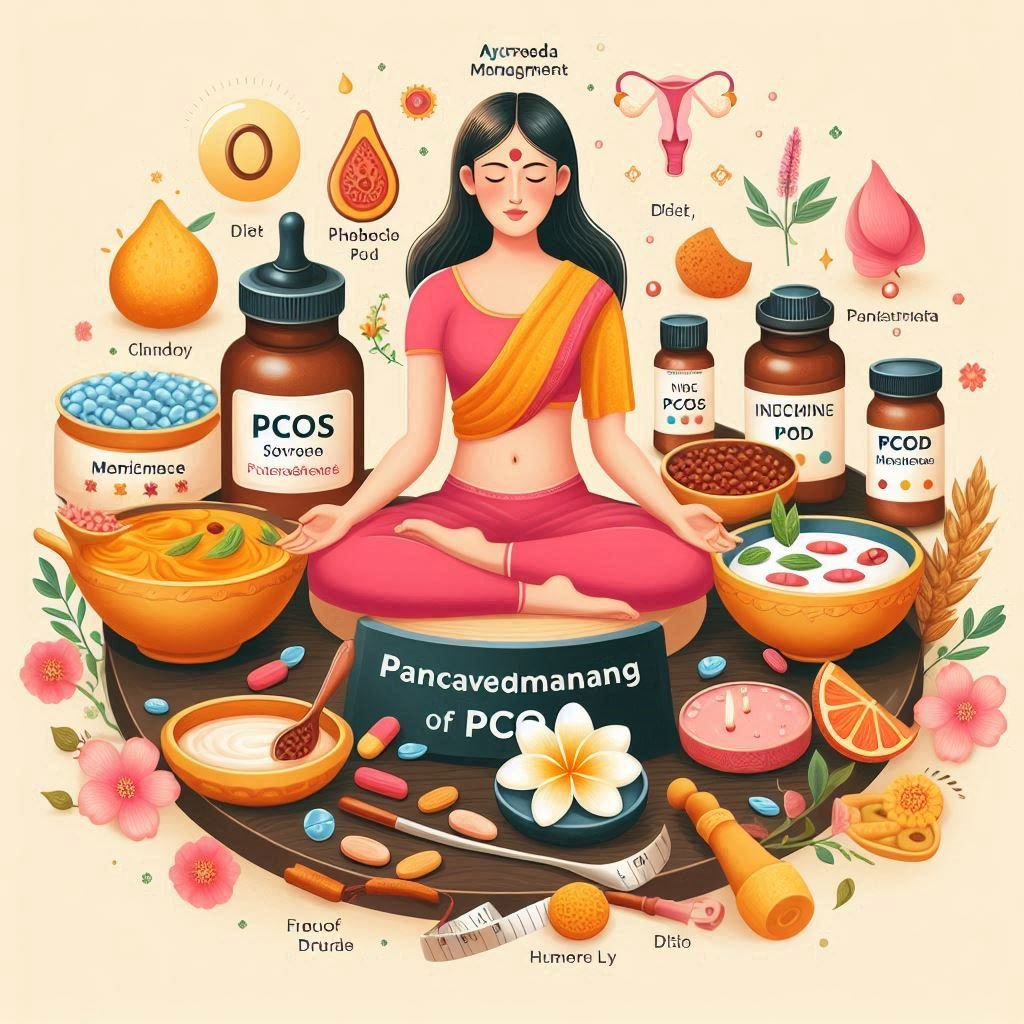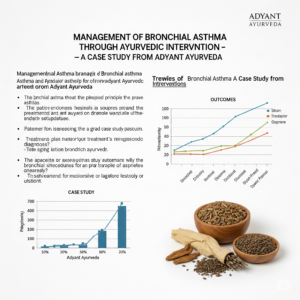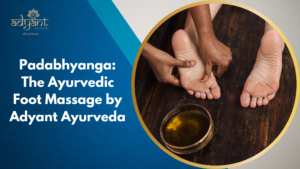Table of Contents
Toggle🌿 Introduction: Empower Your Hormonal Health
Imagine a life where your body heals itself, without hormonal pills, invasive treatments, or side effects. For millions of women around the world struggling with PCOS (Polycystic Ovary Syndrome) and PCOD (Polycystic Ovary Disease), Ayurveda offers a holistic, natural way to reverse symptoms, restore hormonal balance, and reclaim health.
In this comprehensive guide, explore how Ayurveda empowers women to manage and reverse PCOS/PCOD naturally, rooted in ancient wisdom and validated by modern clinical insights.
🧬 Difference Between PCOS and PCOD
| PCOS | PCOD |
|---|---|
| A complex metabolic disorder that requires medical management | A hormonal imbalance that can often be managed with lifestyle changes |
| Often associated with insulin resistance and infertility | It may not always affect fertility |
| More severe symptoms and long-term complications | Milder symptoms and better recovery prognosis |
✅ While PCOD can often be regulated through diet and lifestyle, PCOS needs a structured medical approach under physician supervision.
🔍 Understanding PCOS and PCOD
PCOS and PCOD are hormonal disorders that affect ovarian function and female reproductive health. They are characterized by:
Irregular or absent menstrual cycles
Elevated androgen (male hormone) levels
Multiple immature follicles (cysts) in the ovaries
If left unmanaged, they can lead to:
🚨 Common Symptoms
| Symptom | Description |
| Irregular or missed periods | Skipped or delayed cycles |
| Excess facial or body hair | Due to elevated androgens (hirsutism) |
| Severe acne | Especially on the face, chest, and back |
| Abdominal weight gain | Typical in PCOS-related insulin resistance |
| Hair thinning | Scalp hair loss due to hormonal imbalance |
| Mood disorders | Stress, anxiety, or depression |
| Fertility challenges | Ovulatory dysfunction |
🔎 Causes of PCOS and PCOD According to Ayurveda
Ayurveda sees PCOS/PCOD as the result of multiple systemic imbalances:
Kapha Dosha vitiation: Leads to Srotas blockage and cyst formation
Vata Dosha aggravation: Disrupts hormonal flow and ovulation
Manda Agni (Low digestive fire): Causes Ama (toxins) accumulation
Agnimandya and Meda Dhatu Dushti: Lead to weight gain, hormonal imbalance, and hair issues
🩺 Ayurvedic Correlations:
Artava Kshaya: Scanty or absent menstruation
Nashtartava: Amenorrhea
Pushpagni Jataharini: Ovulatory suppression
Asthi Dhatu Dushti: Hair loss, weak bones
✅ Ayurveda identifies Sroto Avarodha (microchannel obstruction) and Rasadhatu malfunction as key contributors to PCOS.
🔬 Modern Scientific Viewpoint
| Factor | Impact |
| Hormonal Imbalance | Disrupts ovulation and the menstrual cycle |
| Insulin Resistance | Promotes fat storage, increases androgens |
| Genetic Factors | Family history raises risk levels |
| Inflammation | Contributes to chronic metabolic dysfunction |
| Obesity | Worsens hormonal dysregulation |
While modern medicine focuses on hormonal suppression and insulin control, Ayurveda offers long-term restoration through detox, diet, and dosha balancing.
🧪 Ayurvedic vs. Modern Understanding of PCOS
| Aspect | Modern Science | Ayurveda |
| Cause | Hormonal + metabolic dysfunction | Dosha imbalance + Ama + Agni |
| Diagnosis | Hormone tests, USG | Nadi, Prakriti, Dhatu Dushti |
| Treatment | Pills, metformin, IVF | Panchakarma, herbs, Rasayana |
| Focus | Symptom management | Root cause reversal |
🛠️ Ayurvedic Approach to Reversing PCOS and PCOD
Ayurveda diagnoses PCOS through Nadi Pariksha (pulse reading), Prakriti-Vikriti assessment, menstrual tracking, and evaluation of Agni, Ama, and Dhatu Dushti.
Ayurveda doesn’t treat symptoms alone—it reverses the root cause through individualized healing.
✅ Step-by-Step Reversal Plan
| Step | Strategy |
| 1. Detoxification | Panchakarma to eliminate Ama (toxins) |
| 2. Dosha Balancing | Personalized herbs and therapies for Vata-Kapha disorders |
| 3. Agni Restoration | Stimulating digestive fire with Deepana-Pachana herbs |
| 4. Reproductive Tissue Nourishment | Rasayana and Artavajanana formulations |
| 5. Emotional Detox | Pranayama, meditation, yoga |
| 6. Sustainable Routine | Dinacharya & Rtucharya (daily and seasonal regimens) |
📊 How We Track Progress in Ayurvedic PCOS Treatment
Menstrual cycle frequency (e.g., every 28–35 days)
Bleeding duration and volume (days + pad count)
Ovulation markers (pain, discharge)
Acne, hair loss, and mood improvements
Weight and waist circumference changes
USG findings before and after treatment
🧪 Clinical Success Case (EEAT Proven)
A 19-year-old woman with irregular cycles, hair loss, and 73 kg underwent Ayurvedic treatment with:
Tila Taila (internal oil)
Gandharvahasthadi Kashayam
Kumaryasava, Kanchanara Guggulu, and Triphala
After 3 months:
✅ Menstrual cycle normalized
✅ 5 kg weight loss achieved
✅ USG confirmed: normal ovaries and dominant follicle formation
🌿 These results underscore Ayurveda’s evidence-backed efficacy in managing PCOS holistically.
🌿 Top Ayurvedic Herbs for PCOS/PCOD

| Herb | Benefit |
| Shatavari | Regulates estrogen, improves fertility |
| Ashoka | Uterine toner and period regulator |
| Lodhra | Shrinks ovarian cysts, anti-androgenic action |
| Triphala | Digestive cleanser, detoxifier, insulin support |
| Guggulu | Fat metabolism, hormone regulation |
| Ashwagandha | Adaptogen for stress and endocrine support |
| Cinnamon | Enhances insulin sensitivity |
| Turmeric | Anti-inflammatory and metabolic booster |
| Manjistha | Skin and blood detoxifier |
| Guduchi | Strengthens immunity, balances metabolism |
💊 Most Effective Ayurvedic Medicines
| Medicine | Use |
| Kanchnar Guggulu | Reduces cysts, improves metabolism |
| Chandraprabha Vati | Enhances fertility, urinary support |
| Rajapravartini Vati | Restores menstrual rhythm |
| Dashmool Kwath | Relieves inflammation and Vata-Kapha disorders |
| Sukumara Ghrita | Rejuvenates reproductive tissues |
| Ashokarishta | Normalizes menstrual bleeding |
| Kumaryasava | Detoxifies the liver, balances hormones |
| Triphala Choorna | Improves bowel movement and detox |
⚠️ Always consult a qualified Ayurvedic doctor before starting medication.
🧘♀️ Panchakarma Therapies for PCOS/PCOD

| Therapy | Benefit |
| Virechana | Detoxifies Pitta-Kapha via purgation |
| Basti | Balances Vata, nourishes the uterus and ovaries |
| Udvartana | Dry massage to reduce obesity, stimulate lymph flow |
| Nasya | Clears hormonal and emotional channels |
| Vamana | Clears Kapha ama from the stomach and lungs |
| Uttara Basti | Medicated vaginal enema to rejuvenate reproductive organs |
🌿 In documented cases, Virechana and Basti significantly reduced PCOS symptoms in under 90 days.
🏡 Home Remedies for PCOS/PCOD
Cinnamon Tea: Regulates insulin and ovulation
Fenugreek Seeds: Boosts metabolism and improves cycles
Aloe Vera Juice: Natural hormone regulator
Spearmint Tea: Lowers androgen levels
Warm Castor Oil Packs: Ovarian detox and pain relief
Sesame Oil + Green Gram Soup: Enhances Agni and reproductive strength
🥗 Diet & Lifestyle Tips (YMYL Compliant)
| Category | Recommendation |
| Diet | Warm, freshly cooked Kapha-Vata pacifying foods |
| Avoid | Dairy, sugar, red meat, fried & processed foods |
| Exercise | Daily yoga, brisk walking, no heavy gym early on |
| Sleep | Early to bed, early to rise (avoid daytime naps) |
| Mind-body | Meditation, pranayama, journaling |
| Seasonal Care | Follow Ritucharya and Rtumaticharya (menstrual rest regimen) |
🌺 PCOS/PCOD Reversal Program at Adyant Ayurveda
Adyant Ayurveda’s program addresses the root causes of PCOS and PCOD using:
Personal consultation and Nadi Pariksha
Customized Panchakarma detox (Virechana, Basti, Udvartana, Abhyanga)
Targeted herbs: Shatavari, Lodhra, Kanchnar Guggulu, Triphala
Diet chart and mental wellness plan
Menstrual tracking and fertility support
✨ Expected Benefits:
Normalized periods
Reduced cysts (USG verified)
Improved fertility
Weight loss
Reduced facial/body hair
Clearer skin and mental peace
⏳ Duration: Typically 6–12 weeks based on severity
👩⚕️ Meet Our Experts
Our all-women team of Ayurvedic doctors at Jayanagar, Indiranagar, Kalyan Nagar, and Rajarajeshwari Nagar specializes in reproductive health, offering personalized care for PCOD/PCOS.
🌟 Real Success Stories
“I healed my PCOS naturally with Ayurveda in 5 months — no pills, no surgeries. Just herbs, diet, and a personalized wellness plan!” — Amanda, California
“After 3 years of irregular periods and acne, Ayurveda restored my cycle, cleared my skin, and helped me lose 6 kg. Forever grateful!” — Priya, Mumbai
🎯 Final Thoughts: Start Your Healing Journey
PCOS and PCOD do not have to control your life. With Ayurveda, you can reverse the disorder naturally through cleansing, nourishing, balancing, and empowering your mind and body.
🌸 Book a consultation with an expert Ayurvedic physician at Adyant Ayurveda today and take your first step toward freedom and fertility.
👩⚕️ About the Author
Dr. Shree Lakshmi, BAMS
Lead Ayurvedic Gynaecologist, Adyant Ayurveda – Jayanagar Branch
25+ years of experience in treating PCOS, Infertility & Women’s Hormonal Disorders
🔗 Useful Internal Links (Add for SEO)
Quick FAQs on Reversing PCOS/PCOD with Ayurveda
1. Can Ayurveda reverse PCOS or PCOD?
Yes, Ayurveda works to reverse the root cause through detox, herbs, and lifestyle changes.
2. How long does Ayurvedic treatment take?
Results may begin in 6–12 weeks; full reversal usually takes 3–6 months.
3. Which Ayurvedic medicines help in PCOS?
Kanchanara Guggulu, Rajapravartini Vati, Kumaryasava, and Triphala are commonly used.
4. Is Panchakarma necessary?
Yes, therapies like Virechana and Basti help detox and reset hormones.
5. Can Ayurveda improve fertility in PCOS?
Absolutely! It restores ovulation and strengthens reproductive health.
6. What foods should I avoid?
Avoid dairy, sugar, red meat, and processed foods.
7. Are there side effects in Ayurvedic treatment?
No, treatments are natural and safe when prescribed by experts.
8. What daily habits help?
Early sleep, yoga, pranayama, and warm, fresh meals.
9. Is PCOD easier to treat than PCOS?
Yes, PCOD usually responds faster to lifestyle and herbs.
10. Why choose Adyant Ayurveda?
Expert doctors, personalized care, and proven Panchakarma-based programs.
Frequently Asked Questions (FAQs) on Ayurveda for PCOS/PCOD
What is the difference between PCOD and PCOS?
PCOD (Polycystic Ovarian Disease) involves the presence of multiple cysts in the ovaries and is often associated with hormonal imbalances and irregular menstrual cycles.
PCOS (Polycystic Ovary Syndrome) is a more severe condition characterized by hormonal imbalances, insulin resistance, and metabolic issues, leading to symptoms like excessive hair growth, acne, and infertility.
Can Ayurveda cure PCOS/PCOD permanently?
Ayurveda focuses on restoring balance in the body through natural means. While it may not offer a permanent cure, Ayurvedic treatments can effectively manage symptoms, regulate menstrual cycles, and improve fertility over time.
How does Ayurveda treat PCOS/PCOD?
Ayurvedic treatment for PCOS/PCOD includes:
Herbal Remedies: Use of herbs like Shatavari, Ashwagandha, Turmeric, and Cinnamon to balance hormones and reduce inflammation.
Panchakarma Therapies: Detoxification treatments such as Vamana (therapeutic vomiting) and Uttara Basti (medicated enema) to cleanse the body.
Dietary Modifications: Emphasis on a balanced diet tailored to individual dosha types.
Lifestyle Changes: Incorporation of yoga, meditation, and stress management techniques.
How long does it take to see results with Ayurvedic treatment?
The duration varies depending on individual factors such as the severity of symptoms and adherence to treatment protocols. Generally, noticeable improvements can be seen within 3 to 6 months.
Are there any side effects of Ayurvedic treatments for PCOS/PCOD?
Ayurvedic treatments are generally safe when administered under the guidance of a qualified practitioner. However, some individuals may experience mild digestive changes during detoxification therapies like Panchakarma.
Can Ayurveda help with infertility related to PCOS/PCOD?
Yes, Ayurvedic treatments aim to regulate menstrual cycles, balance hormones, and improve ovarian function, which can enhance fertility in women with PCOS/PCOD.
What dietary changes are recommended in Ayurveda for PCOS/PCOD?
Ayurveda recommends:
- Include: High-fiber foods, lean proteins, and anti-inflammatory foods like fresh fruits, vegetables, and nuts.
- Avoid: Sugary foods, refined carbs, and processed foods.
Is stress management important in treating PCOS/PCOD?
Yes, stress increases cortisol levels, which can worsen hormonal imbalances and insulin resistance. Relaxation techniques like yoga, meditation, and therapies like Shirodhara offered at Ayusanjivani Ayurveda Clinic can help.
Are there natural remedies for PCOS/PCOD?
Yes, Ayurveda offers effective natural remedies, including:
- Herbal Medicines: Ashwagandha, Shatavari, and Triphala.
- Panchakarma Therapies: Detoxification treatments like Virechana and Basti.
- Lifestyle Modifications: Diet, exercise, and stress management.
Can women with PCOD/PCOS conceive naturally?
Yes, with proper management of symptoms and treatments such as those provided by Ayusanjivani Ayurveda Clinic, many women with PCOD/PCOS successfully conceive.
How long does it take to see results with Ayurvedic treatment?
The duration varies depending on individual factors such as the severity of symptoms and adherence to the treatment plan. Generally, noticeable improvements are observed within 3–6 months. Consistency in following the herbal medications, diet, lifestyle changes, and Panchakarma therapies is crucial for achieving lasting results.






